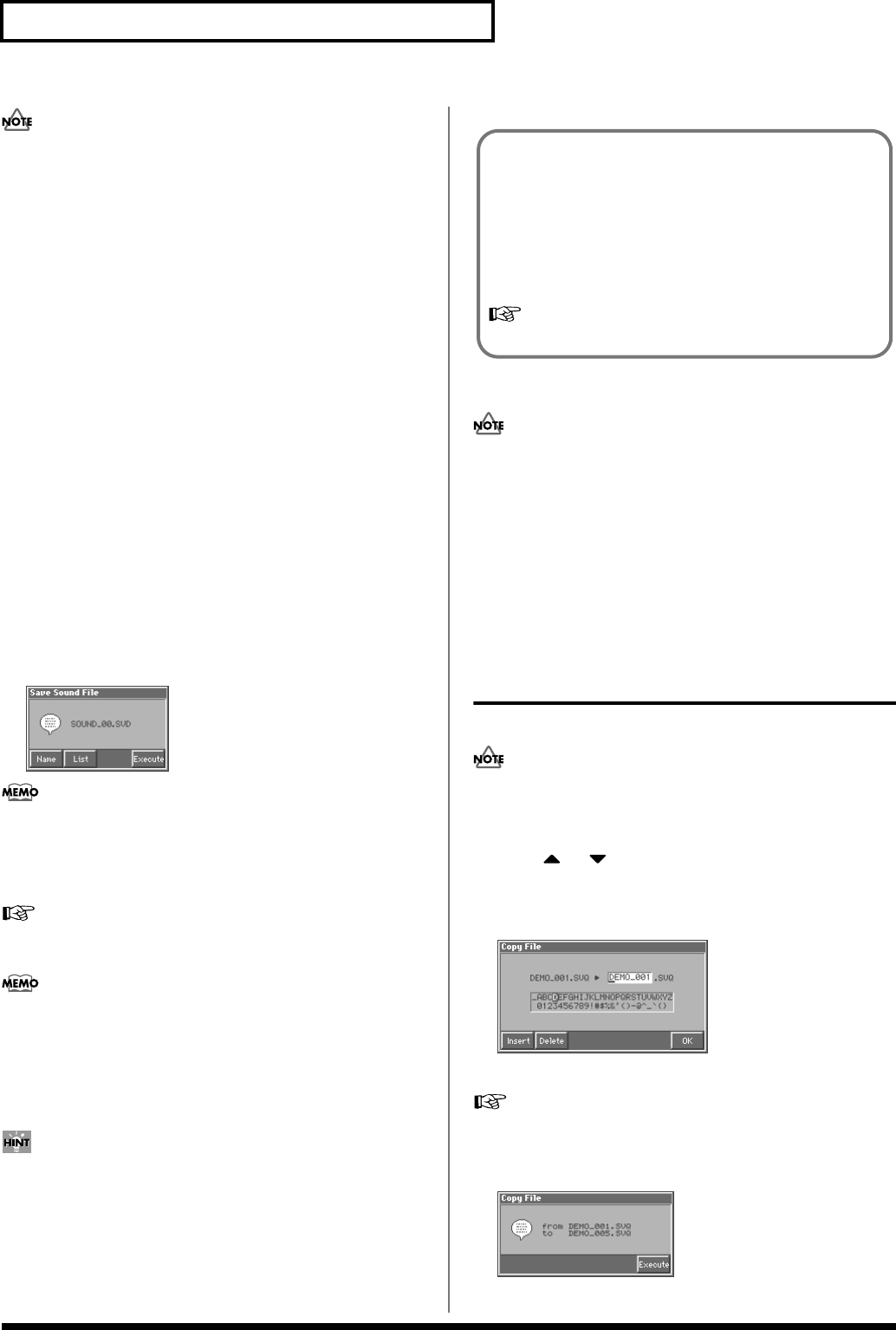
190
Disk-Related Functions (Disk Utility)
• The filename extension will be “.MID” whether you use “Save
SMF (Format 0)” or “Save SMF (Format 1).” These two formats
cannot be distinguished through file name extension.
• When “Save Song File” is selected, the settings of the patch or
rhythm set assigned to each part of the multitimbre/
performance will not be saved.
• If you save using “Save Song File,” the multitimbre/
performance settings will be saved in the state in which they
were when the Save operation was executed. If you change the
multitimbre/performance in the middle of a song and save the
song after recording, the settings at the recording start will not
be saved. In other words, even if you play back from the
beginning of the song, it will begin with the multitimbre/
performance sounds that were selected when the Save operation
was executed. If you have switched multitimbres/performances
during the song, you must use the Microscope window to store
the bank select and program numbers for the desired
multitimbre/performance at the beginning of the song.
• Even if you save using “Save Song File,” playback will not use
the correct sounds on MRC Pro sequencers other than the
Fantom. To play it back with correct sound, record the
corresponding Bank Select and Program numbers.
4. Once you’ve selected the format in which the data is to be
saved, press [8 (Select)].
The Save **** window appears.
fig.16-07_50
The title of the window will depend on the data saving format.
5. You can assign the file a name of up to eight characters.
Press [5 (Name)], and assign a file name in the Name
window that appears.
For details on assigning names, refer to “Assigning a Name” (p.
30).
If a song name has already been assigned, the first eight
characters of the song name will automatically be assigned for
the file name. If no song name is assigned, “SONG_000” will be
automatically be assigned for the file name. A sound file and
chain file will automatically be named “SOUND_00” and
“CHAIN_00,” respectively.
To view the list of files on the disk, press [6 (List)]. To select a
chain file from the list, move the cursor to the desired file and
press [8 (Select)].
6. Press [8 (Execute)] to execute the operation.
• If you assign a file name that is identical to a file name that
already exists on the disk, and attempt to save the file, a message
of “File “****” Already Exists! Over Write OK?” will appear. To
overwrite the old file and save the new, press [7 (OK)]. If you
wish to abort the saving operation, press [8 (Cancel)].
• If you attempt to save data on a disk that has not been formatted
on the Fantom, a message of “Unformatted Disk” will appear.
Please format the disk on the Fantom (p. 191).
Copying a File to Another
Name (Copy)
Here’s how to copy a file to one having a different name.
Master disks of Standard MIDI Files releases, etc. from Roland
cannot be copied.
1. Access the Disk Utility screen (p. 187).
2. Press or to select the file that you want to copy.
3. Press [3 (Copy)].
The Copy File window appears.
fig.16-08_50
4. Modify the file name, and press [8 (OK)].
For details on assigning names, refer to “Assigning a Name” (p.
30).
The Copy File window appears.
fig.16-09_50
5. Press [8 (Execute)] to execute the operation.
File Names and Song Names
MRC Pro songs and Standard MIDI Files have song names in
addition to file names. The file name is used to distinguish the
file on disk, and must be specified before the file can be saved.
You will find it easier to manage your songs if you use the file
name to categorize the type of song, and use the song name to
assign the title.
Assign a song name in the Song Name window (p. 137).
